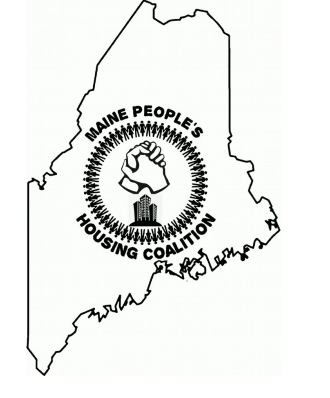
Growing up working in my family’s property management business I have watched not just the homeless population grow exponentially in recent years, but also the unaffordability of housing reach a point that it seems clearly unsustainable to most. It has always appeared to be a complex web of inter-related issues that are quickly approaching the point where everyone in our city is affected in some way. Last summer I attended The March To End Homelessness where we learned about the history of gentrification in our city, and many great connections were made. The end result of this march was the formation of The Peoples Housing Coalition. As a Portland resident, I was very happy to get involved and bring my experiences to this network to strive at resolving many issues that have gone on far too long. In this article, I will explain a bit about this coalition and some of the goals people are currently organizing around. Readers can find the group on Facebook and Twitter and are welcome to attend organizing meetings that are held monthly.
The group’s mission statement is as follows: “We are open to the public, democratic, and include a wide range of people with different experiences and housing statuses. As a coalition, we come together around the broad purposes of holding elected officials accountable, enforcing demands, and ensuring transparency. We do not function like member-based organizations with platforms and complex structures but abide by a general code of good faith conduct to bring individuals and organizations together in a network for shared purposes. We strive to center the experiences of those directly impacted. When we lift from the bottom, everybody wins. We strive to provide an open and supportive community for people experiencing houselessness to share their experience and knowledge. We believe that housing is a human right and our goals are to end, destigmatize, and decriminalize homelessness; prevent future homelessness; and obtain safe, affordable housing for all.”
Within the confines of acquiring affordable housing, or ensuring our homeless neighbors are housed there are quite a few things to consider. Many of these are issues the group is currently researching and organizing around. Currently, in America 60% of renters are cost-burdened, meaning they currently pay more than a third of their income on rent. Likewise, the cost of homeownership has increased which forces many into renting with no way to ultimately move to ownership. There are a lot of elements that result in rents being so high. Aside from high tax rates, construction costs are so high that developers often opt to only build expensive units as its the only way to gain a return on their investment once operating costs are factored in. With the current push for code enforcement in the city, it has also increased the operating costs for existing landlords which has resulted in profit becoming the deciding factor for who actually receives a lease.
Through research and meetings over the past few months, we have found there are two crucial areas that if addressed, could potentially result in solutions that would resolve some of the cost-related issues. First, many towns in the state have land rules that restrict the building of apartments. These zoning codes make it impossible to build more affordable housing in more areas. Likewise, the laws that mandate including affordable units in new construction allow developers to pay a fee to escape this obligation, causing a reduction in supply parallel to an increase in demand. In Portland “affordable” units are also based on the area median income or AMI. Currently, a person would have to earn $65,100 and $78,120 to qualify for these “affordable” units under these guidelines. This is because the AMI figure is based on an area that includes surrounding towns with higher average incomes. If the definition for “affordable” was based on just our city, the median income would be drastically lower. The end result is that when affordable units do get created, the people who need them the most don’t qualify because they are still too expensive. Our city currently subsidizes these units at 100% to 120% of the AMI, but if they were subsidized at 30% – 60% this would result in a lower barrier of entry that would be more appropriate for the average incomes in our city.
Another key issue the group is working to address is discrimination that exists within the local housing system. Many individuals holding housing assistance vouchers are now starting to lose them. After years of searching and applying, their vouchers are not being accepted for a wide array of reasons. The most common reason vouchers are denied is that rents are consistently higher than the programs cover. Likewise, requiring three months’ rent upfront is typically more than most programs will cover for people. As a result, people staying at the shelter can be denied access to apartments and it does not count as a form of discrimination. Many anti-discrimination laws are also not enforced or difficult to prove so it is nearly impossible for folks at the shelter to even acquire an apartment due to the high barriers for entry. The lack of clearly established rights and responsibilities for all parties involved leaves a lot of people fending for themselves when struggling to keep a roof over their heads. Rents increase each year, and as the taxes and operating costs rise this burden is felt most by the tenants and shelter residents.
To keep up with rising costs, property owners move towards establishing more expensive units and this can result in increasing numbers of evictions. Each year as the rents increase, people struggle more and this results in more evictions for nonpayment of rent. Once evicted, that mark on people’s records can become a reason to deny rental on future applications. Another problem area is when building owners sell a property and the new owner terminates all the leases by “non-renewal” so they can renovate the whole property. Each time this occurs it reduces the supply of affordable units, and a great example of this was the recent sale of Bayside Village which got a lot of attention several months ago. Many landlords in Portland end all their leases in the spring and summer so as to have maximum occupancy while the heat is on. The other side of this equation is that there is too much competition for the empty units in a short period of time. Many people end up spending excessive amounts of money on application fees, which makes the high deposits more of a burden and the people who need housing the most often do not obtain it. Each time a building like Bayside is sold it creates more competition for the same units and fewer people are able to acquire apartments they can afford on their income alone. If a housing assistance program does in fact pay enough for a vacant unit, there are often many other applications submitted and property owners opt for the person with a cosigner and higher credit.
There is certainly a wide array of issues that affect the people who are currently homeless in Portland. Outside the long list of reasons why low-income residents continue to lose housing, and why marginalized communities struggle to obtain it, there are still yet more issues that pertain to both communities. Where the coalition functions as a network we have worked with Homeless Voices For Justice to advocate for better solutions to the emergency shelter system in Portland than what is currently proposed. Within this topic is the “bed cap”, the facility is to be built based on data for how many people on average present at the shelter each night. This number has not taken into account the number of people who do not utilize these services. Some individuals don’t use the shelter for safety or sanitation reasons, but others are actually banned entirely.
Currently, a large number of people occupy a very small building and residents can receive a year-long criminal trespass order for altercations in the facility. In council meetings, we learned that the number of people banned from the shelter could easily equal the number of people who actually use it. In the same way that homeless residents cannot access housing, many have access issues with the shelters themselves. Advocates had encouraged creating multiple small shelters to solve the root cause of this problem. In a model like this, the people who require additional services could receive them, neighborhoods would receive smaller facilities, and the staff could also be kept safest while working. Winters in Maine are frigid, the lack of access to shelter results in death and many have lost friends this way. If the issues renters face continue, so will the rise in our homeless population. Likewise, if the issues the homeless community faces continue, we will sadly continue to lose our friends and neighbors when these deaths could be avoided. As a group, we view solving the issues most renters face as a way to prevent those numbers from increasing. This allows us to look at ways to actually find housing for those at the shelter and ensure they receive services and support so they can succeed in their new living situation.
Many who are reading this are likely already aware that rents in Portland are out of control, that application fees and high deposits make renting harder, or that the number of homeless has risen exponentially in recent years. This is the main function of the group, to connect everyone in our city into a welcoming community ready to work towards solutions. Housing and homelessness are certainly connected and it’s shocking how many people could become homeless if they experience an unforeseen emergency. The more people can come together effectively through a group like this, the easier it becomes to put the voices of those affected at the forefront of the discussion. As the group grows, more experience and knowledge can be incorporated into finding effective solutions to these issues that are all very much related.
Everyone deserves to be able to afford their dwelling, and certainly shouldn’t have to endure things like black mold just to live somewhere in their price range. If programs exist to help people at the shelter pay rent and get on their feet, it shouldn’t be impossible to find a home while utilizing rental assistance programs. We hope by continuing to write letters to the editor, speaking at city hall meetings, and doing outreach we can grow this project and awareness of it. There are many serious issues that affect people’s lives, and if decisions made by our city are hurting our residents, we as the people of Portland must come together and see that the proper changes are made. It is my hope in writing this article to not advocate for any one solution, but to encourage all residents of Portland to unify. If we approach each other with patience, respect, and civility we can all learn from each other and find ways to correct problems while ensuring we also aren’t causing harm to other residents of our city.
At this point, there are certainly more questions than answers, and ultimately, I just don’t want to see people suffer needlessly anymore. This housing group has found a number of great places to start organizing, but renters, workers, and taxpayers still hold little power in the city. It is by connecting people as neighbors and allies that we gain the ability to truly affect change. It is my hope in writing this that a healthy dialogue can be encouraged in Portland. It is my hope that we can make compassion a priority and set a good example for other cities in America facing similar issues. Where Maine goes, so goes the nation, and I truly believe we can make a significant difference if we strive to work together on these things that affect all of us.





